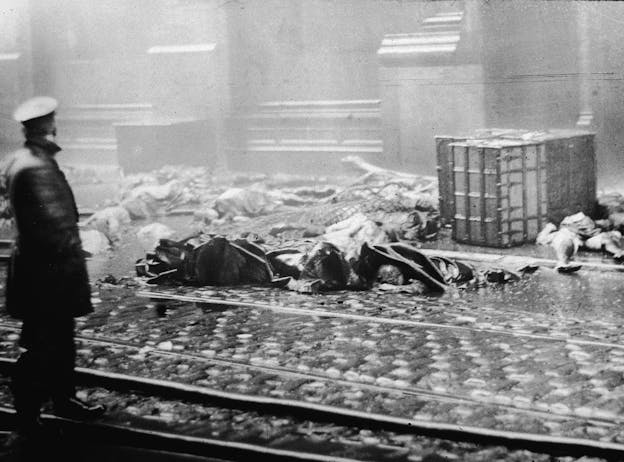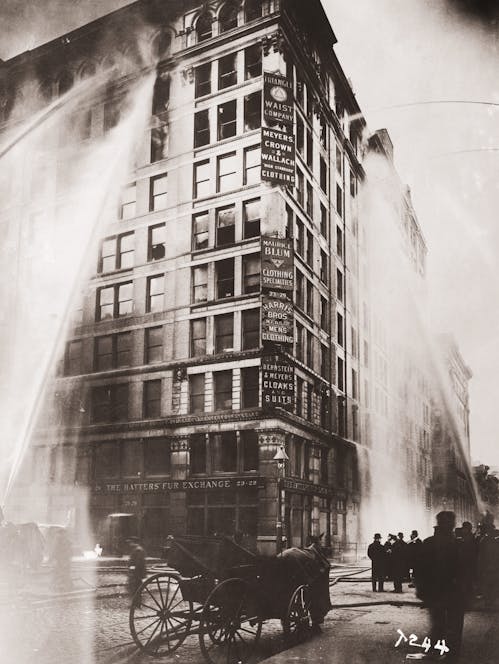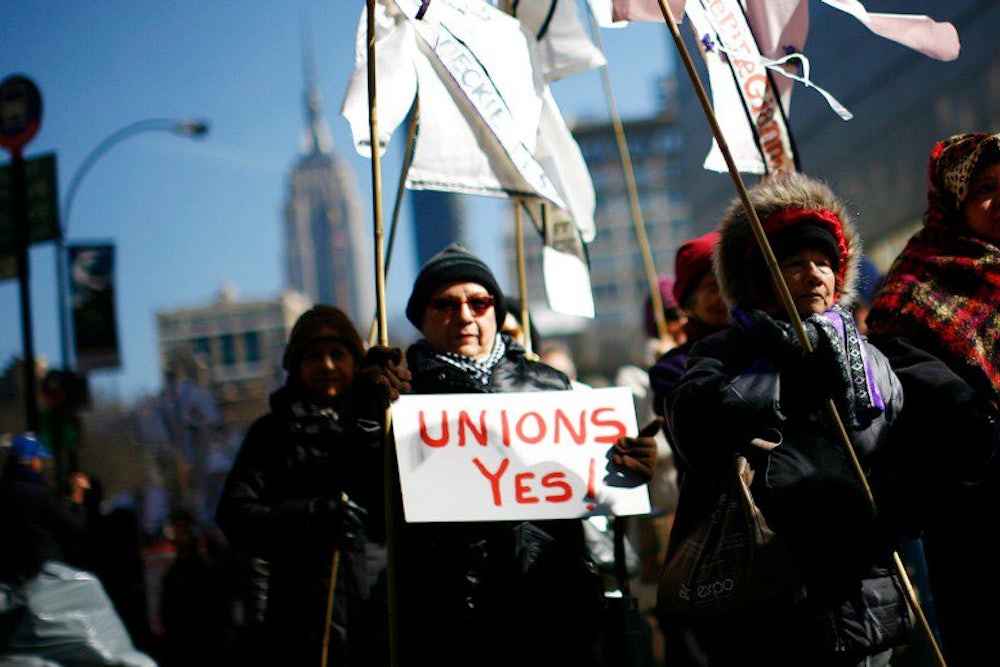They started coming out the windows at a quarter to five on a bright, sunny spring afternoon. Large bundles of fabric, tossed from a ninth-story window in New York’s Greenwich Village. There was the sound of a muffled explosion and breaking glass, and the smell of smoke. Then the dark dress goods falling and landing with a heavy thud on the paving stones below.
“He’s trying to save the best cloth,” one observer said knowingly, sure he was watching a garment factory owner trying to salvage his stock.
Then someone noticed they weren’t bundles of cloth at all, but young women. The screams started, the crowds came running, and the fire engines and police wagons raced up. But there was little any of them could do.
In the span of 15 minutes on March 25, 1911, a fire at the Triangle shirtwaist factory killed 146 people, making it one of the deadliest disasters in New York City history. The vast majority of the dead were young women, or girls. Many of them were recent immigrants, or the children of immigrants, trying to eke out a living as best they could in New York’s rag trade.
They died when a fire escape collapsed. They died smashed against doors their bosses had locked, afraid the women might steal a few pennies worth of leftover cloth. They died leaping in desperation down elevator shafts, after the cars they knew were not coming back. They died with their dresses on fire, jumping from those ninth-story windows.
“I learned a new sound, a more horrible sound than description can picture. It was the sound of a speeding, living body on a stone sidewalk,” reported William Shepherd, a United Press writer who had just happened upon the scoop of his life. “Thud-dead, thud-dead, thud-dead. Sixty-two thud-deads. I call them that because the sound and the thought came to me at the same instant. There was plenty of chance to watch them as they came down.”

When we hear politicians today rail against the sins of organized labor, we should remember the Triangle factory fire. Perhaps no event in American history better illustrated the need for unions—public as well as private—and galvanized a generation of policymakers to protect laborers. Frances Perkins, a young social worker visiting a friend in the Village, ran to the fire bells and saw the women fall. She went on to become Franklin Roosevelt’s secretary of labor, America's first female cabinet member, and in that capacity would write much of the Social Security Act and the Fair Labor Standards Act. The day the Triangle burned, Perkins would say, “was the day the New Deal began.”

Perkins helped convince New York’s state legislative leaders—Al Smith, Robert Wagner, and “Big Tim” Sullivan—to put together a sweeping investigation of working conditions in New York state. Later, as a U.S. senator, Wagner pushed into law the Wagner Act, a federal guarantee that workers had the right to organize. The minimum wage, the eight-hour day, overtime pay, workmen’s compensation, unemployment compensation, the right to speak your piece and to challenge an employer for firing you—not to mention sprinkler systems, multiple exits, fire alarms, and doors required by law to open from the inside—these are all standards of decency that came directly from those reforms, and helped improve the lives of every citizen.
We are told today that we don’t need any of that and maybe never did. Unions in the American private sector have been all but annihilated, and it’s not just the organized right or Wisconsin Governor Scott Walker—the most visible example so far this decade—waging war on public employee unions. Other governors and legislators, Republicans and Democrats alike, have enthusiastically taken up this fight around the country. Some would gladly revoke public unions’ right to organize, bargain, or speak out at all, as has occurred in Wisconsin, putting Walker in the top tier of Republican presidential hopefuls for 2016.
But the past was prelude. A hundred years ago, anyone looking at the Triangle fire could see how the unprofessional, thoroughly politicized public workforce that existed before unions endangered us all.
The fire companies that sped to the Triangle factory were not equipped with ladders that reached above the sixth floor, in a city that was already studded with skyscrapers. The policemen who watched the girls fall helplessly to the street below had been beating some of these same young women just the year before, during the nation’s first great garment strike, “The Uprising of the Twenty Thousand.”
There, police had ordered the pimps and gangsters they controlled to bring prostitutes to the picket lines to start fights and create a riot to be suppressed with beatings and arrests. While they did not succeed in breaking the strike, their efforts did help many New York garment shops—including the Triangle—succeed in withholding union recognition, firing and blackballing strikers, and preventing the sorts of workplace improvements that might have prevented those awful 15 minutes.
The cops did such things not because they were innately terrible people, but because they were ordered to by their political bosses, who had complete control over who the city hired, including for police and fire jobs. Becoming a public employee at all was a privilege, one that you often had to pay for—“pay to play” on its most primitive level. Just becoming a cop on the beat in New York cost $200, a substantial amount of money at the time. Moving up the ladder also had its costs: $1,400 to become a lieutenant, $14,000 to become a police captain. The cops, in turn, sweated this money out of gamblers, gangsters, and brothelkeepers under their jurisdiction. Firefighters had less contact with the underworld, but fire captains and inspectors also routinely took bribes, for certifying, for instance, that the gas connections to new businesses were safe, and for allowing them to turn on their pilot lights.
The bosses at Tammany Hall were too preoccupied with shaking the money tree to worry much about equipping the fire department with the means to get young women out of a burning building or to prevent upper-story fires from happening in the first place. They were too busy extorting large sums from New York businessmen. In return, they provided business with the full-fledged support of the state, in what were then its constant, bloody battles with labor.
This unremitting shakedown, this machine of exploitation, was a reflection of how things worked in the garment industry. Major retailers such as the big, shiny department stores—Macy’s, Gimbel’s, Abraham & Straus—gave out contracts to suppliers, who in turn subcontracted them down to factories like the Triangle or home “sweatshops,” where whole families turned their tiny apartments into suffocating workspaces. From the highest to the lowest, each in turn sweated every penny out of those below them and could spare no mercy in the quest for economic survival.
The men who owned the Triangle factory, Max Blanck and Isaac Harris, didn’t want 146 of the people who worked for them to die in agony. But they also never bothered to supply their factories with effective firefighting equipment of any kind because that cost money—and because they had a history of suspicious, end-of-the-season fires that conveniently burned up their heavily insured, surplus cloth.
Public unions could have put policemen and firemen out of the Tammany machine's reach. Private unions could have protected the women working at the Triangle factory. Even in safer times, the need endures to guard workers from the worse tendencies of government and business. What the fabrente maydlakh, “the fiery girls”—the young, predominantly Jewish women who led The Uprising of the Twenty Thousand—wanted in 1911 was an America where their rights would be respected. Where no one had to beg for favors dispensed at the largesse of some wardheeler, or “cockroach boss” as the sweatshop owners were called, but where all might say what they wanted and gain at least a living wage for their toil. Without unions, those rights might never have been won.
Meanwhile, in Scott Walker’s Wisconsin, Republican legislators have introduced another new bill to overturn long-established law in the state’s workplace. Dubbed the “Abolishing the Weekend” or “Abolishing the Sabbath” act, it would overturn state law mandating that workers get at least one full day of rest out of every seven. Even the Triangle workers got one day a week off.
